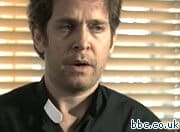The BBC has signed up for a second dose of a self-proclaimed “heretical” and “unholy” comedy about an inner-city liberal vicar, risking charges of anti-Christian bias.
Watch a behind the scenes film on the first series of Rev
In its first series, “Rev” portrayed vicar Adam Smallbone protecting his dwindling flock from ‘bigoted evangelical hypocrites’ and middle-class families who were trying to get their kids into the popular church school.
It was described by the Bishop of Willesden, Pete Broadbent, as “a load of wet liberals working out their angst about CofE and not being very funny”. The Archbishop of Canterbury said the show was “really rather good”.
Language
The comedy, which contained adult themes and language, was broadcast on BBC Two on Monday evenings.
It was co-created by James Wood and Tom Hollander, who also played the lead role as the vicar. Mr Hollander said they were “trying to depict a real world”.
Mr Wood commented: “The one word I would pick to describe the show would be ‘heretical’.”
Eccentric
The opening episode of the first series of Rev features a decaying, near-empty church attended by a handful of eccentric oddballs and senior citizens.
At one Sunday service, the church begins to fill with wealthy young families, but it transpires they are only attending in the hope of getting their children into the local church school.
In the second episode, a neighbouring evangelical congregation asks to share the church building while their own building is being renovated.
Bigotry
The evangelical church is headed by a tall, handsome, slick communicator who fills the church with happy youngsters.
But “the cold bigotry that lies not far beneath the surface of the evangelicals’ smiles” soon comes to the fore, according to one viewer writing for the New Statesman.
The evangelicals are shown to be unforgiving, money-obsessed hypocrites who reach a large young crowd only because of trendy gimmicks.
Sympathetically
The third episode features a Muslim group that wants to use the church to teach Islamic prayer to children.
The vicar is keen on the opportunity for a multi-faith dialogue, but fears the move may be opposed by “prejudiced” members of his own congregation.
The Muslim characters are portrayed sympathetically, shown to be self-assured in their beliefs and moral values.
Oppose
Inspired by their moral confidence, the liberal vicar decides to oppose a lap-dancing club that is planning to open opposite the church school. But he is anxious not to be seen as moralising, judgmental or anti-sex.
The more zealous members of his congregation start a “stop the filth” petition. One of the male members signs it but is later discovered to be a regular visitor to lap-dancing clubs.
In 2009 a Church of England document about the BBC’s portrayal of Christianity made reference to the proposed show, which had a working title of “Handle with Prayer”, saying the church would “wait and see” whether it relied on “stereotypes”.
The same document said the BBC risked treating people of faith like an “increasingly rare species” to be studied as curiosities by an outside audience.
Fair game
In 2010 Radio 2 host Simon Mayo warned that religion was “increasingly driven to the margin” on the BBC.
And in 2009 Jeremy Vine, another of the Corporation’s radio presenters, said he believed it had become “almost socially unacceptable to say you believe in God.”
Last month a former BBC news anchor warned that Christians are “fair game” for insults at the BBC whilst Muslims must not be offended.
Peter Sissons, whose memoirs were being serialised in the Daily Mail, said: “Islam must not be offended at any price, although Christians are fair game because they do nothing about it if they are offended.”

